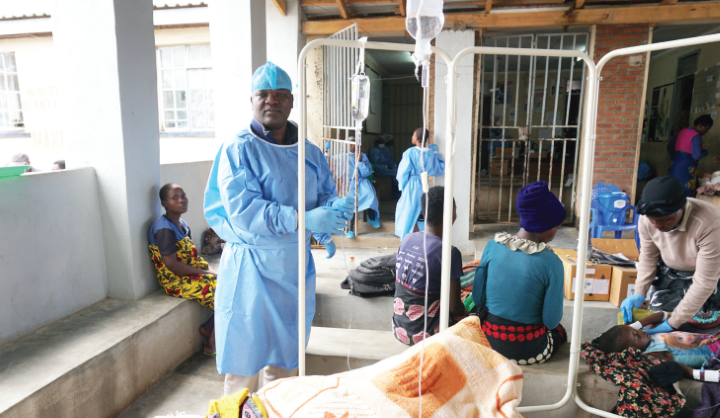Balancing work and breastfeeding
From August 1 to 7, Malawi joined the world in celebrating the world breastfeeding week. ALBERT SHARRA spoke to some working women who struggle to balance breastfeeding and work
She is 28, married and with a six year-old child, but does not dream of having another child soon, unless her current employer changes the conditions of service to extend the maternity leave.

Bridget works in Blantyre. We withhold her real name to protect her.
“I almost lost my job,” recalls Bridget. “I spent three months of my maternity leave, but my child preferred only breast milk than any other food. As a mother, I could not afford to leave the child hungry for work. At first, I tried to breastfeed her before work, at lunch and after work, but it was not working especially at lunch hour because I live in Chigumula while my offices are near Maselema in Limbe.”
Her sneaking out of her job to breastfeed her baby at home nearly cost her the job.
“I was warned several times for absenteeism and sneaking out. I survived at a disciplinary hearing where they recommended I proceed on unpaid leave until I was ready to perform my duties,” explains Bridget.
Agnes Scotti had a worse experience. She lost her job at a tea estate in Thyolo. She says despite applying for 30 days more to continue breastfeeding, the company told her when she returned that she had constructively resigned, since being a business, they cannot pay employees who are idle for 120 days.
These are not stories peculiar only to the two. It is an experience most working breastfeeding mothers go through. The World Health Organisations (WHO) recommends that for a healthy baby, breastfeeding should take place for at least six months.
However, the Employment Act says a female employee shall be entitled, within every three years, at least eight weeks maternity leave on full pay. This is to allow the mother to breastfeed exclusively. Yet, that is just a third of the recommended time.
The UN marks the annual World Breastfeeding Week by highlighting the pivotal role of exclusive breastfeeding, saying it gives children the healthiest start in life. It calls for the need to strengthen policies to promote nursing with stronger workplace policies.
A UN statement says the theme Women and work–Let’s make it work, emphasises the need for better support systems and policies that enables working mothers to breastfeed.
“We know that breastfeeding helps children to survive and thrive, enabling infants to withstand infections, providing critical nutrients for the early development of their brains and bodies, and strengthening the bond between mothers and their babies. And the benefits of breastfeeding last a lifetime,” reads the statement in part.
It also notes that a recent Lancet study found that infants who were breastfed for at least one year stay in school longer, score higher on intelligence tests and earn more as adults than those who were breastfed for only a month.
Several other studies reveal that only 38 percent of infants globally are breastfed exclusively. The Unicef website indicates that 28.6 percent babies aged below six in Malawi are not exclusively breastfed.
Joseph Magomo, a retired nurse in Lilongwe, argues it is working mothers who create a big gap in exclusive breastfeeding. He says employers cannot extend the 90 days to 180. However, he says the last two months of breastfeeding are the worst because employers do not create better platforms to allow the mothers to breastfeed.
Janet Guta, deputy director of clinical services in the Ministry of Health pleads with employers to ensure their staff breastfeed exclusively.
Both Bridget and Scotti say it is hard to balance breastfeeding and work. They say the most hurting thing is to endure heavy breasts, inflamed by milk.
“When you are breastfeeding, milk continues to accumulate. Anything that you eat, leads to milk production. Women also believe that when a baby cries, there is a direct psychological link which makes the mother prickly,” says Bridget.
She observes that breastfeeding at break time is impractical and slowly isolates a mother from the baby.
“When you get home, you find the baby asleep. Eventually, the child stops sucking and that affects the mother physically and psychologically,” she says.
Scotti says breastfeeding mothers struggle hygienically. She says milk has its own smell and comes out any time to breastfeeding mothers. This, she says requires one to be careful and more hygienic. She adds that most women use breast pads to avoid messing their clothes while at the same time keeping the breasts clean.
However, according to our spot check with different shops, including Shoprite and Game Stores, we established that most retailers sell breast pads at K3 500 per packet. It is a tall order to most women. The 2014 Human Development Index (HDI) says 61.64 percent of Malawians live on less than $1(K500).
“It is not easy to balance hygiene and breastfeeding. You need to bath at least four times a day and each time, you have to change clothes, bra and if you use the breast pads, you have to change them too. You cannot do this while at work full time,” explains Scotti, adding that she uses any cloth to keep the breasts dry.





